|
I recently had a discussion about how authors go about deciding on names for characters in their novels and plays. This, of course, led to a quick perusal of the Internet, a lively debate and a top-ten list. Or several top-ten lists. This is what happens when librarians have too much time on their hands (which admittedly isn’t very often). 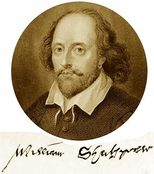 We must, of course, start with the Bard of Avon, who, for the record, I believe actually did write his own plays! Shakespeare is at his wittiest when coming up with clever, charming and apropos names for his characters. Shakespeare’s Top Ten Character Names: 1. Sir Andrew Aguecheek (Twelfth Night) Post nasal drip, anyone? 2. Sir Toby Belch (Twelfth Night) ‘nuff said. 3. Dogberry (Much Ado About Nothing) All constables should be as much of a hoot! 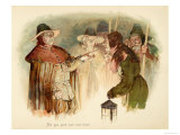 Dogberry on watch 4. Iago (Othello) Just saying the name leaves an evil taste in the mouth! 5. Launcelot Gobbo (and his dad Old Gobbo) (The Merchant of Venice) Shylock’s fun-loving, crude servant 6. Mistress Overdone (Measure for Measure) Shameless hussy 7. Mistress Quickly (Merry Wives of Windsor) Overdone’s equally shameless colleague 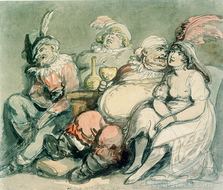 Falstaff and his Doll 8. Doll Tearsheet (Henry IV, Part 2/Henry V) Falstaff’s favorite hussy and BFF with MQ 9. Dr. Pinch (The Comedy of Errors) 10. Puck (A Midsummer Night’s Dream) Devious trickster fairy Honorable mention to Christopher Sly (The Taming of the Shrew) (Oops, guess this one goes to 11!) 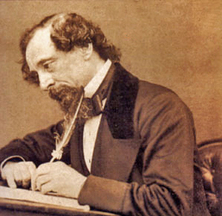 Two-pence Chuck But what about Charles Dickens? His fans will stage a thrown-down for the championship between Chuck and Will at the turn of a page. Dickens' Top Ten Character Names: 1. Uriah Heep (David Cooperfield) Could there be a better name for a villain? (Darth Vader excepted, of course) I mean, you can't think the name without conjuring up images of body waste. 2. Pumblechook (Great Expectations) Pip’s guardian -- his name sounds as loud-breathing and rotund as he is. 3. Mr. Sowerberry (Oliver Twist) Say the name and you will have the very image of the cruel, ugly undertaker on your tongue -- yuck! 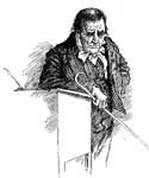 Wackford Squeers 4. Paul Sweedlepipe (Martin Chuzzelwit) Can you say “eccentric?” 5. Wackford Squeers (Nicholas Nickleby) also daughter Fanny, son Wackford, Jr. and Mrs. Squeers. The nasty caretaking family who run the orphanage. Possibly the origin of the phrase “wack-job?” 6. Polly Toodle (Dombey and Son) Plump, jolly nurse -- what else could she be with a name like that? 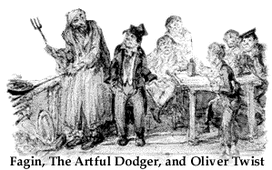 7. Bumble (Oliver Twist) True to his name 8. Fagin (Oliver Twist) Another perfectly named villain 9. Harold Skimpole (Bleak House) Notorious tightwad -- and his name evokes that character defect 10. Seth Pecksniff (Martin Chuzzlewit) One of the biggest hypocrites ever imagined with a wonderfully evocative name. 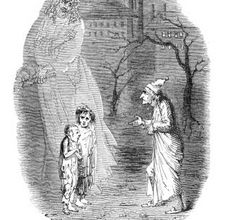 Ebenezer with the twins Ignorance and Want But we can't possibly exclude the one we all know and love: Ebenezer Scrooge (A Christmas Carol). It's a name that has entered the vernacular; everyone knows how miserly a “scrooge” is... Oops, guess this one goes to 11, too!
0 Comments
Today I want to sing the praises of authors who focus on nonfiction -- but who are able to turn facts into gripping drama that keeps you turning the pages long after you should have turned off the light.
I am currently reading Hot, Flat and Crowded by Thomas Friedman (Version 2.0) and I can barely tear myself away from the book. Okay, the topic is already compelling: our global environmental crisis. (And if you've spent any time in the Midwest and southern Great Plains this summer, you would be witness to evidence that global warming is not a myth: severe drought in many southern areas, extended heat waves, and extremely violent storms and flooding in the north.) So, yes, he's already got me at the topic -- but his way with the written word is compelling as well. His sentences are vivid; his choices of anecdotes and quotes are incisive; and his ability to take a dense concept and slice it into accessible, digestible chunks should be the envy of all writers. And, above all, he writes with passion about his topic. That's something that we teachers tell our students all the time: choose a topic that you are passionate about and your writing will benefit immensely. It's something that I notice in my book club discussions: the best discussions grow out of books that we either loved or hated. The mushy middle provokes nothing but more mush. Jon Krakauer, author of Into the Wild and Into Thin Air, is another writer who breathes both poetry and the tension of the commercial cliffhanger into nonfiction. "Nonfiction that reads like fiction" may be a cliche, but I was there on Mount Everest with the climbers. Krakauer's descriptions of the disastrous 1996 expedition had me checking my own fingers and toes for frostbite; kept me up until 3 a.m. compulsively reading "just one more page" because I couldn't bear the thought of leaving those foolhardy, yet brave men and women clinging to life on the mountain. I recently re-read The Devil in the White City for my book club and once again fell under the spell of Erik Larson's incredible nonfiction writing. As a Chicago girl, born and bred, I appreciated the extent to which he delved into his topics: the creation of the 1893 World's Fair juxtaposed with the serial killer H.H. Holmes. His details are meticulous -- his prose is compelling, even nail-biting as he swoops from the the broad expanses of the fairgrounds as the exhibition is slowly, agonizing shaped by the hand of architect Daniel Burnham to the claustrophobic confines of the hotel of death that Holmes built and to which he lured his fair-going victims. This is nonfiction writing that sinks it teeth in you and doesn't let go. |
AuthorTo find out more about me, click on the Not Your Average Jo tab. Archives
February 2024
Categories
All
|
 RSS Feed
RSS Feed